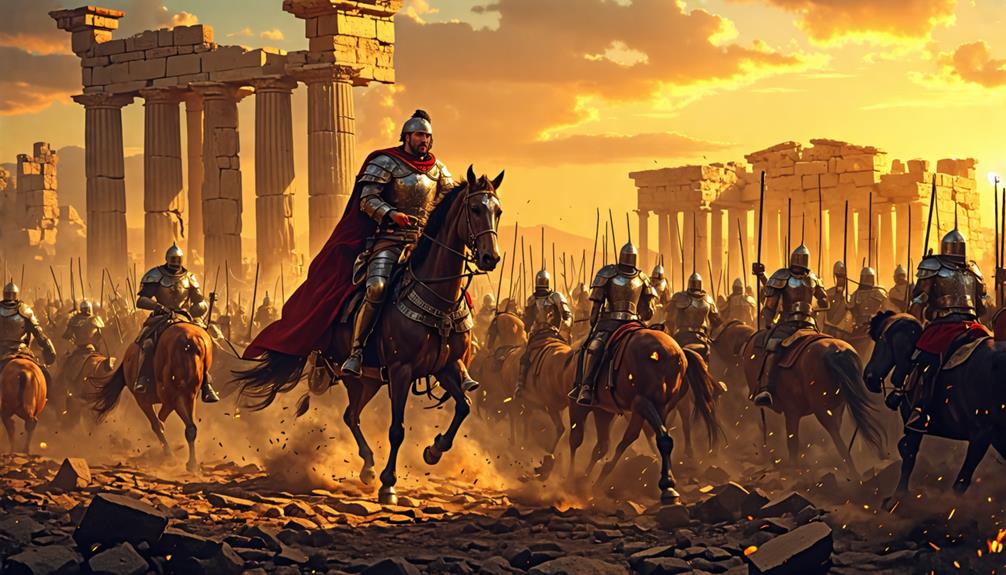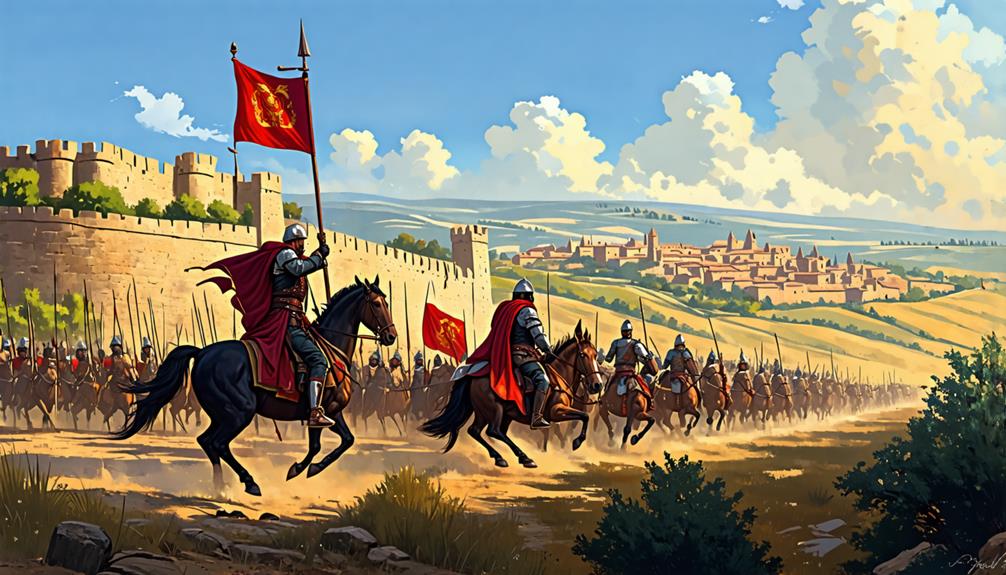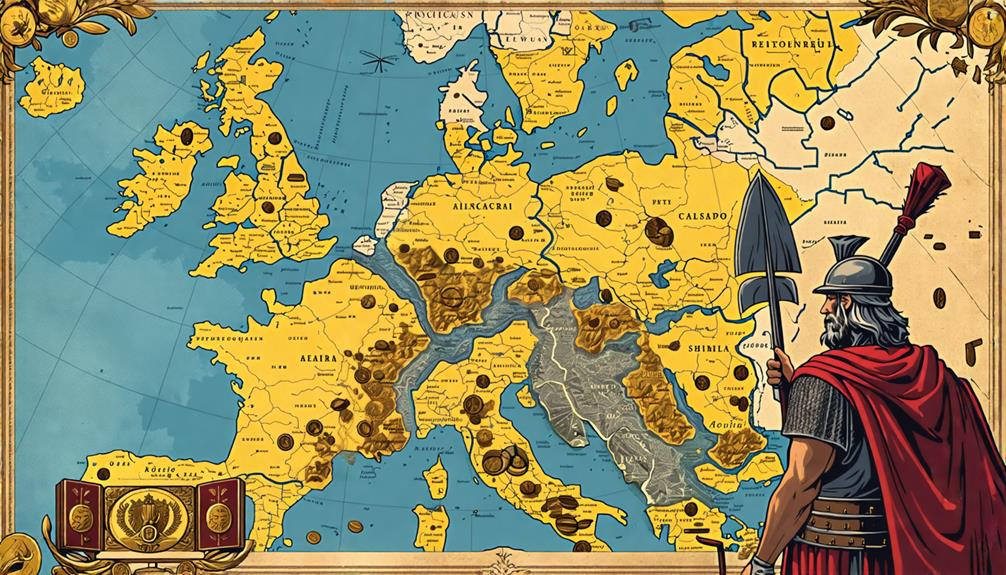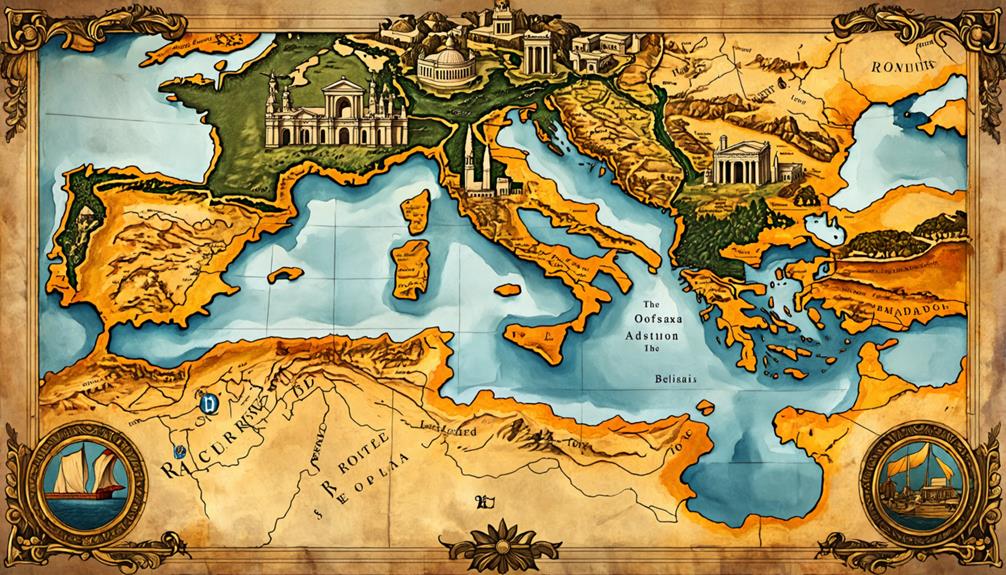In the 6th century AD, the Byzantine general Belisarius reconquered large swaths of the former Western Roman Empire.
But what if Emperor Justinian had given him free rein to fully restore the empire to its former glory?
This alternate timeline explores a world where Belisarius succeeded in his campaigns, dramatically altering the course of European history.
From the religious dynamics to the geopolitical boundaries, the very fabric of medieval society would have been reshaped in fascinating ways.
Belisarius's Early Victories

In an alternate timeline, Belisarius's string of early victories could have led to a very different fate for the Eastern Roman Empire. Some historians theorize that if he'd been able to maintain momentum, Belisarius may have fully reconquered the western provinces lost to barbarian kingdoms, reuniting the Roman Empire. Alternatively, overextension and changing priorities in Constantinople might've undercut his grand ambitions.
While this alternative history centers on Belisarius in the 6th century, one could imagine a similar scenario playing out under a different brilliant general centuries later, perhaps during the Byzantine Empire's resurgence in the 10th century.
The consequences of a reunited Rome would have profoundly reshaped European history in unpredictable ways. Trade routes, cultural exchange, and the political balance of power all could have evolved along divergent paths.
Political Obstacles in Constantinople
Had Belisarius conquered the Western Roman Empire, the effects on history could have been profound. One theory is that the Byzantine Empire would have expanded to its former size, potentially delaying or preventing the rise of Islam in the Middle East and North Africa.
Alternatively, it's possible that the over-extended empire would have fractured under its own weight, leading to a different set of kingdoms and nations.
Interestingly, Charlemagne, the King of the Franks, was crowned as the 'Emperor of the Romans' by Pope Leo III in 800 AD. In a sense, he did reconquer much of the Western Roman Empire, although it wasn't as extensive as Belisarius might've achieved centuries earlier.
Potential Conquest of Hispania

In an alternate timeline, if Belisarius had focused on conquering Hispania, he'd have encountered the powerful Visigothic Kingdom that had dominated the Iberian Peninsula since the 5th century.
One theory suggests that his strategic prowess would have been rigorously tested against the well-established Visigoths, potentially leading to a long and difficult campaign.
Conquering Hispania might've necessitated meticulous planning, innovative tactics, and the full strength of the Byzantine army to secure victory.
It's worth noting that the Umayyad Caliphate did conquer most of Hispania in the 8th century, indicating that such a feat was possible, albeit under different circumstances and by a different power.
Religious Unity and Papal Relations
If Belisarius had conquered Hispania with the Pope's support, it may have strengthened the Western Roman Empire. One theory is that a reunited empire under Justinian could have better resisted later invasions. Alternatively, over-expansion might've weakened the Byzantines in the long run.
In our timeline, the Visigoths eventually converted to Catholicism and allied with the papacy. Had Belisarius defeated them earlier, it could have meant a different religious landscape for medieval Hispania.
Charlemagne did lead later Frankish conquests in Spain during the 8th century, but never fully integrated those territories.
Economic and Administrative Challenges

If Justinian had expanded his empire despite the economic costs and administrative challenges, it may have altered the course of history.
One theory is that it could have led to a more unified and enduring Byzantine Empire, while another possibility is that overextension would have caused the empire to fragment and collapse sooner.
While Justinian didn't ultimately realize this goal, the Ottoman Empire later expanded further into many of these same territories.
This demonstrates that such conquests, while difficult, were achievable under certain conditions.
Long-Term Sustainability of Restoration
If Justinian had successfully restored the Western Roman Empire, it may have led to a more unified and stable Europe in the following centuries. One theory is that this could have meant a continuation of Roman law, culture, and infrastructure across a wider area.
However, the Empire's resources would likely have been strained, potentially leading to economic challenges and difficulty effectively administering the vast territory.
While Justinian's attempt ultimately failed, similar efforts to reunite the Roman Empire were made by later rulers like Charlemagne in the 8th century CE. It's possible that a successful reunification at that time could have reshaped the political and cultural landscape of medieval Europe.
The reader is left to consider the potential implications of such an alternate historical scenario.
Geopolitical Ramifications for Europe

Had a reunification of the Western and Eastern Roman Empires occurred under Belisarius in the 6th century AD, it's possible that a dramatically different Europe would have emerged in subsequent centuries.
One theory is that a strong, unified Roman realm may have been better positioned to withstand invasions by groups like the Lombards, Avars, and Arabs, significantly altering the trajectory of medieval European history.
The political and cultural evolution of Europe would likely have taken a very different path in this scenario.
Interestingly, the Byzantine Emperor Justinian I did come close to achieving a partial reunification of the old Roman Empire during this same time period, although it was relatively short-lived.
Conclusion
While we can only speculate, had Belisarius been given free rein, he might've resurrected the Western Roman Empire, forever altering Europe's destiny.
A unified Rome could've weathered the storms of invasion and upheaval, nurturing a vibrant tapestry of culture and faith.
Yet, the tides of history are fickle, and even the mightiest empires eventually succumb to the gentle embrace of time.
One can't help but wonder what might've been, had fate smiled differently upon Belisarius.

Leave a Reply